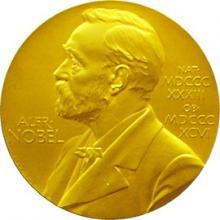Jewish culture has always highly valued education and thus professions that rely on mental prowess. This is why such a significant fraction of all the people to win the Nobel Prize have come from Jewish backgrounds. There are many Jewish Nobel Laureates in every category of the prize, great contributors to global society who have stood as shining examples of their people. There are certainly too many Jewish Nobel Laureates to feature in this article, but here are a few of the most notable among them.
Johann Friedrich Wilhelm Adolf von Baeyer was the first Jew to ever receive the Nobel Prize, winning the 1905 prize for chemistry. He was recognized for synthesizing indigo, the active component of blue dye. This may not seem like a big deal, but the ability to create synthetic blue had a huge impact on society, especially economically. Natural indigo is rather rare, which made it a major commodity for thousands of years. Johann von Baeyer's work essentially made the color blue affordable. Without his work in pigment synthesis, another famous Jew named Levi Strauss wouldn't have been able to sell so many of his odd, denim pants.
Boris Pasternak, winner of the 1958 prize for literature, is a unique case. He is one of only four people ever forced to refuse the Nobel Prize. The other three were forbidden to accept it by the Nazi German government, while Pasternak was denied the award by the Soviet Russian government. Boris Pasternak is nonetheless one of the most influential writers of the 20th century. His novel Dr. Zhivago is often cited as a seminal work of dissident literature and he also endeavored to translate the works of William Shakespeare and Johann Goethe for Russian speakers.
Ernst Boris Chain and the work he did to win the 1945 prize for medicine is a testament to the importance of cooperation. Along with Howard Florey, Chain picked up Alexander Fleming's work concerning penicillin to prove that it was viable as a therapeutic substance. Fleming, who discovered penicillin in the late 1920's, had been unsuccessful in his attempts to generate large quantities of the substance or to unlock its potential as a disease-fighting agent. Chain and Florey's research revived penicillin and focused its applications, proving that it is a great community, not just great individuals, who change the world.
Albert Einstein and Niels Bohr, the winners of the 1921 and 1922 physics prize, respectively, were instrumental in the discovery of the principles of quantum mechanics, the basis for much of modern thought in the field of physics, including harnessing nuclear fission. Without their work the atomic bomb never would have been invented, but we also wouldn't have the nuclear power reactor or radiation oncology.
Henry Kissinger officially won the 1973 peace prize for his work on the Paris Agreement, the diplomatic discourse that effectively ended the Vietnam War. More broadly, Kissinger's great contribution to the world was his pursuit of peace between capitalist and communist societies in the midst of the Cold War. He popularized the policy of detente, the de-escalation of governmental hostilities that opened up relations between the United States, the USSR and China, among others.
John Harsanyi was another great collaborator, working with the famous John Nash and Reinhard Selton to win the Nobel Prize for economics in 1994 for their work in equilibrium selection, an economic theory that has been vastly influential in the still-emerging field of incentive-driven behavior. Harsanyi's work in Game Theory was instrumental in applying models of human behavior to economic fluctuations.
